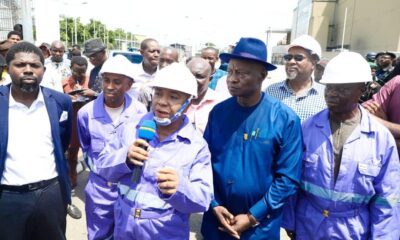Business
FIRS Rakes In N4.178tr From Taxes

The Executive Chairman, Federal Inland Revenue Service (FIRS), Muhammad Mamman Nami yesterday said the agency has raked in N4.178trillion revenue out of the N4. 239trillion target it set for itself between January and October.
He also claimed that he inherited N38billion debts from his predecessor, Mr. Babatunde Fowler which included about N20billion official debts and N18billion unofficial.
He explained that it is the core mandate of the FIRS to collect Stamp Duties, adding that the first tax introduced in 1904 by the British colonial masters was Stamp Duties.
Nami, who made the clarifications in a chat with some media chiefs in Abuja, said the FIRS was not usurping the powers of any agency.
He expressed optimism that the agency should be able to exceed the N5. 076trillion tax receipts for 2020
He said: “As at October, we have realised about N4.178trillion out of our target of N4.230trillion. This translates to about 98 per cent or approximately 99per cent.
“All things being equal, we should be able to exceed our target of N5.076 trillion by the end of 2020.”
On the allegation that his predecessors could not meet revenue target, he said: “I don’t think that is correct. I remember former Executive Chairman, Ifueko Omoigui-Okauru and her successor, Kabiru Mashi met their targets and even exceeded them. But since they left office, nobody has come in to ensure that this type of performance is sustained.
“What we have done as a team, I don’t want to give myself credit because they are fantastic, is to leverage their experience of about 30 years, to see that we come up with strategies that will move tax administration forward. And one of the things we have done is to ensure that we deploy technology,” he explained.
He said the FIRS under him inherited about N38billion debts officially and unofficially.
He said: “We actually met a lot of debts but like someone said, service is a growing concern. What we met was about N20billion and what we have prioritized is paying them by installment. I think as it is today, we have gone past 50 per cent. That is what we saw officially.
“Unofficially, we met a debt of about N18 billion which was borrowed from our Special Project Account. Today, I think we have refunded about N11billion to that account,” he said.
Nami insisted that it is the prerogative of the FIRS to collect Stamp Duty because it is a tax introduced to the country in 1904 by the colonial masters.
“When you talk of Stamp Duty, we have stated our core mandate and if you define Stamp Duty, you will now realise that we are not usurping anybody’s powers. It is somebody who wanted to take our powers from us.
“If our responsibility as a revenue generating unit is to assess, collect and account for tax, it will be unfair for any agency of government to now say that it wants to collect tax irrespective of the way the tax is called.
”I want you to also remember that the first tax introduced in Nigeria by the colonial masters in 1904 was Stamp Duty. If this was the first tax and if somebody is coming in 2016, 2017, 2018, 2019 and 2020 to say that this person or agency should administer this, I think it should be strange to all of us,” Nami said, adding that the FIRS was not “sleeping over tax evasion” because it is a serious crime being committed by big men in the society.
He said some service providers have been uncovered in Lagos for not remitting Value Added Tax (VAT) running into billions of naira.
The FIRS chief said: “Tax evasion is a very serious crime; it is a thing that worries us a lot. This is why we have a department in the Enforcement Support Group called Special Crime Department. We are actually not sleeping over it; we are not trying to ignore the fact that there are big men in this country that are evading taxes
“But from the way we are going, we have what we call multiplier effects even in business investment. We are a typical investment country, so it is one thing that leads to another.
“What I have done is to empower Enforcement Support Group to leverage technology and secondly other stakeholders’ collaboration for information sharing.
“We just concluded one investigation in Lagos. That was why I hid myself in Lagos for one week. We discovered that there are service providers, let me not be specific, that work for some of our taxpayers but they collect VAT and they do not remit.
“I can assure you that there are people that are so big in this country but assessments have been raised in billions of naira and sent to them. Like I said, it is an indirect tax regime that we are pursuing. We told them that they are only agents, it has got nothing to do with their income, it has nothing to do with the profits they made for rendering these services.
“They have earned 100 per cent of their income and something (VAT) that is added on top to bring to the FIRS, they collected and kept.
“So, what we did was to attach the invoice for such organisations and asked them to give us the money. They know they cannot come near us, we won’t tolerate such things. And it is as a result of that the revenue figure continues to increase.”
Business
Eazipay Offers Zero-Interest Loans To 150,000 SMEs, Employees

With a mission to ignite growth, encourage business continuity and help businesses and employees thrive, Eazipay is gearing up to propel the dreams of 150,000 SMEs and employees to new heights through her relief fund.
Gone are the days of financial constraints and stifled dreams. With Eazipay’s support, SMEs and employees alike can bid farewell to limitations and embrace a world of endless possibilities.
Whether it’s start up, business expansion or personal development, Eazipay is here to make dreams come true.
The mind-blowing initiative, which kicked off this month, would end in December, and will also offer a range of perks and benefits designed to put a smile on the faces of SMEs and employees alike.
From exclusive discounts to various advisory services and beyond, Eazipay is committed to spreading happiness and creating lasting impact in people’s lives and to the growth of businesses.
The technology company which offers products and services that range from payroll management to IT/Device management and assessments, “Eazipay isn’t just providing financial support but also unleashing a wave of growth and prosperity for SMEs and employees across the nation.
“Interested businesses and individuals can take part in this initiative directly from the Eazipay website: www.myeazipay.com”.
Business
SMEs Critical For Sustainable Dev – Commissioner

The Commissioner of Finance, Lagos State, Abayomi Oluyomi, has described Small and medium Enterprises (SMEs) as a critical engine for sustainable development in any economy.
He said this recently at the 10th anniversary of the Alert Group Microfinance Bank and the opening of their new head office in Lagos.
According to the National Bureau of Statistics, SMEs accounted for about 50 per cent of Nigeria’s gross.
He commended the positive impact of the Alert MFB as it empowers SMEs in the State.
“Alert MFB in the past 10 years has been at the forefront of empowering SMEs in Lagos State, disbursing over N30bn in loans to over 30,000 individuals having small to medium businesses over that period, which is quite remarkable”, he said.
Speaking, the Group Managing Director of Alert Group, Dr Kazeem Olanrewaju, revealed that the financial institution commenced business in 2013 as a microfinance bank.
“We started this journey in 2013 and it has been expanding. Today, they have about 10 branches across Lagos. They have supported well over 30,000 clients and have disbursed over N30bn.
“The company has been profitable since the second year. Looking at the market and the available opportunity, the Alert MFB board decided to come together to establish a Microfinance Institute (MFI), which is the Auto Bucks Lenders”, Dr. Olanrewaju said.
The GMD further stated that the company was focused more on supporting businesses and small and medium enterprises.
“The loan to support business represents over 98 per cent. The consumer loans you will see are the ones given to entrepreneurs. So, the area of focus of Alert MFB and Auto Bucks Lenders is to support businesses across the country.
“With the establishment of Auto Bucks Lenders, we have the opportunity to also do business outside Lagos. So, presently, we have offices in Ogun State and Oyo State. We intend to go to every part of Nigeria to support what we are doing”, he declared.
Business
Retailers Explain Price Drop In Cement Cost

The cement market, in the last couple of weeks, has seen a significant turnaround with prices tumbling from between N10,000 and N15,000 per 50kg bag to between N7,000 and N8,000.
The sudden rise in the prices of cement and other major building materials in February this year upsets the construction industry, especially in real estate, where many developers were forced to abandon building sites.
A recent market survey conducted by The Tide’s source in different locations across the country confirmed a price drop, ranging between N7,000 and N7,500 per bag, though BUA cement is selling for N7,500 to N7,800 per 50kg bag, depending on location.
Both entrepreneurs and major distributors who were interviewed, explained that the price drop is due to low demand and government’s intervention.
At the peak of the price hike, the Federal Government called a meeting with major producers where it was agreed that a bag of cement should be between for N7,000 to N8,000, depending on location.
But the producers did not comply with this agreement immediately, followin which “Nigerians stopped demanding for cement; many project sites were abandoned as developers sat back and waited for the prices to come down.
“So, what has happened is an inter-play of demand and supply with price responding, which is Economics at work”, Collins Okpala, a cement dealer, told the source in Abuja.
In the Nyanya area of the Federal Capital Territory, a 50-kg bag of Dangote cement now sells for between N7,000 and N7,500, while BUA cement sells for between N8,500 and N9,500, down from between N11,000 and N12,000 respectively.
In Lagos, the product has seen significant price drop too. In Ojo area of the state, Sebastin Ovie, a dealer, told our reporter that what has happened is a crash from the January price, attributing the crash to low demand and stronger naira.
“The current price of the product is between N7,000 and N7,500 per 50kg bag, depending on the brand. This is a significant drop from the average of N12,000 which most dealers were selling in February and March”, he said.
A dealer in Agege area of the state who identified himself as Taofik Olateju, told the source that sales are picking up due to the drop in price.
He recalled that Nigerians at a point stopped buying due to the high price of the product at N15,000 per bag.
“I am sure most dealers ran at a loss then because we had mainly old stocks which we wanted to offload quickly”, he said, confirming that the product sells for between N7,500 and N8,000, depending on the brand and the demand for the brand.
Continuing, Olateju noted that “because the naira is now doing well against the dollar, it will be unreasonable for manufacturers to continue to sell the product at the old prices. I also believe that the federal government’s intervention and the threat to license more importers may have worked, leading to the reduction in price”.
In Enugu, the source reports that the product sells for between N7,200 and N7,500 depending on the brand and location.
“This is a city where the price of a 50kg bag went for as high as N12,000 and N13,000 in some cases in February and March”, Samuel Chikwendu said.
He added that the prices of other building materials, especially iron rods, have also dropped considerably which is why, he said, activities are picking up again at construction sites.
The story is slightly different in Owerri, the capital of Imo State, where Innocent Okonkwo told the source that low demand was also driving the price drop, adding that a 50kg bag was selling for N9,000 on the average in the state.
Sundry market observers are optimistic of further price reductions, but they remain cautious as manufacturers, wholesalers, and retailers continue to play critical roles in setting prices for end-users.
They lamented, however, that despite Nigeria’s status as one of the largest producers of cement in Africa, the price of the product continues to rise, particularly in the face of high inflation impacting the building materials market generally.
Okpala in Abuja highlighted the variations arising from direct sourcing from manufacturers versus procurement through dealers, with traders holding old stocks selling products at prices ranging from N8,500, N8,300 to N8,000 per bag.
Lucy Nwachukwu, another dealer in Abuja, said the significance of procurement volume in determining cement costs, noting that stability in prices has been observed over the past month, with the product retailing for between N7,000 and N7,800 depending on the brand.
In Port Harcourt also, a customer, Daniel Etteobong Effiong, said the price goes between N7500 to N8500, depending on the brand and the location one is buying from.
-

 Niger Delta3 days ago
Niger Delta3 days agoRSG Seals Two Hospitals In Bonny …Set To Inaugurate Anti-Quackery Committee
-
Entertainment3 days ago
Davido Narrates How His Song Became President’s Ringtone
-

 News3 days ago
News3 days agoN5.2trn Debt: FG Recovers N57bn From 10 MDAs
-

 Editorial3 days ago
Editorial3 days agoThat Odili’s Health Centre Gesture
-

 News3 days ago
News3 days agoBonny-Bodo Road: FG Offers Additional N20bn, Targets December Deadline
-
Business3 days ago
Nigeria Set To Get $2.25bn World Bank Loan … Plans Diaspora Bond
-

 Niger Delta3 days ago
Niger Delta3 days agoMile One Market: Committee Commences Verification Exercise …Denies Allocations Of Shops
-
Sports3 days ago
Chairman Lauds NPFL Referees Improvement

